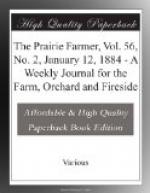Breeder and Sportsman: The old story of the countryman and his deceptive plug was recently repeated in Jersey, where people are supposed to have their eye-teeth cut. It was an old gray pacer this time, attached to a dilapidated wagon by cords and odd ends of harness. The astute hotel proprietor refused to give $20 for the outfit. Owner then replied that he would pace the horse over a good track in three minutes. Landlord bets $100 to $50 that he can’t do it. Money was then put up, and owner wanted to draw, as the track was a good way off, and he could not spare the time to attend to the matter. Landlord insisted that the horse must pace or pay forfeit. A sulky and harness were borrowed, and judge placed in the stand, according to Hoyle. Owner claims the right to three trials, according to National Association rules. Point conceded. Old crowbait is scored up and given the word. Works off the mile very slick in 2:43. Landlord feels small, and $100 goes into owner’s pocket. Another greenhorn bets $100 that horse can’t beat 2:43. Rips off another mile 2:42, and owner pockets the money. Landlord feels better; owner better yet. Latest advices: same old side-wheeler won two or three hundred same way at Flemington, some more at Paterson, and has had a little pacing circuit all to himself. “What fools these mortals be!”
* * * * *
The following by Richard White in the New York Sun, might very properly have been dedicated to those trichinae-frightened twins, Bismarck and Paul Bert.
Sing, heavenly muse, the noble
quadruped,
Whom Orientals
oft presume to scorn,
Who glorifies the food that
he is fed,
Extracting carbon
from convenient corn.
Peaceful his life, his death
almost sublime,
His end a grand
effect of modern art;
Scarce has he bid a sharp
adieu to time,
When he is packed
and ready for the mart.
He goes abroad, our land to
represent;
The earth, from
pole to tropic, is his range;
He fills the bill for use
and ornament,
Greases the world,
and regulates exchange.
Though ministers abroad may
lightly treat
The rights that
only appertain to men,
They must protect our Western
corn-fed meat,
Defending our
four-footed citizen.
If Bismarck bars our barrels,
tubs, or cans,
Forcing our pork
to make its way incog,
Upset his schemes, and overthrow
his plans,
And clear a pathway
for the native hog.
* * * * *
Dr. Detmers, V.S., stationed at the Union Stock Yards at Chicago, by the Department of Agriculture for the purpose of inspecting swine, alleges that during the last four months he has examined at one packing-house not less than four thousand hogs and has seen at least ten times that number, but has not seen the slightest trace of disease, as he certainly should if any had existed. During the last two years but very little swine plague has prevailed anywhere, and, as far as he knows, no diseased hogs have been shipped; nearly if not all the small rendering tanks having been closed.




